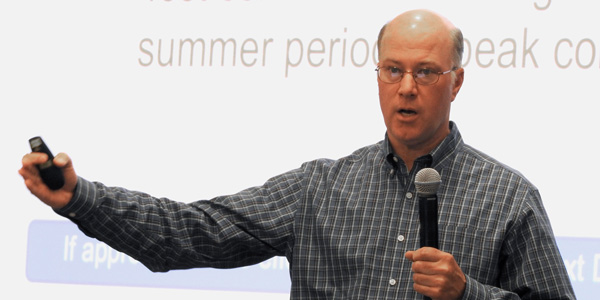VALLEY FORGE, Pa. — PJM’s proposed problem statement and issue charge on whether states can control energy-efficiency participation in the capacity market drew heated debate on two issues — one expected and the other not — at last week’s Market Implementation Committee meeting.
Because of the ongoing debate, a vote on endorsing the proposal was delayed until next month with one objection and one abstention.
The proposal was developed in response to a current proceeding before the Kentucky Public Service Commission on energy-efficiency requirements, said Denise Foster, PJM’s vice president of state and member services. PJM’s rules on load-modifying resources offering into the market, such as demand response, don’t address whether energy efficiency should be treated the same as DR, so the RTO is considering how and whether to add it.
However, PJM is specifically limiting the scope to avoid discussing whether state jurisdiction factors into the discussion, despite stakeholder suggestions to include it. The issue charge would establish requirements for energy efficiency entering the market, rules around those requirements and how to handle energy-efficiency resources that have already cleared past capacity auctions.
Tom Rutigliano, representing Electric Market Connection, expressed concern that the proposal would ostensibly grant state regulators new power to restrict energy efficiency participation in wholesale markets. He pointed to the Supreme Court case EPSA v. FERC as confirming that FERC has jurisdiction over retail customer participation in the wholesale markets.
“We appreciate that Kentucky may have claims, but we feel at this point, it’s not really appropriate to put PJM and its stakeholders in the position of deciding if those jurisdictional claims are correct or not,” he said. “This is really not at this point a stakeholder issue.”
His concerns were echoed by Rick Drom, an attorney with Eckert Seamans Cherin & Mellott, who offered a presentation titled “A Flawed Solution Seeking a Problem.” He said any discussion on PJM deferring to state regulatory authorities is premature and that the proposal risks balkanization of the energy market.
Drom’s arguments, however, were overshadowed by his unwillingness to name whom he represented at the meeting. He said his client, whom he said is one of the largest energy efficiency providers in the PJM footprint and operates in Kentucky, fears reprisal from opponents. Drom said he met with senior PJM staff to explain the situation, and they agreed to let him speak without naming his client.
Bruce Campbell of CPower noted that Eastern Kentucky Power Cooperative is seeking a declaration from the Kentucky PSC that the utility has the authority to “terminate electric service to any energy-efficient resource provider who violates Kentucky law, a commission order, rule or regulation or commission-approved tariff.” Drom acknowledged that was part of his client’s desire to keep its name hidden.
When Drom refused to identify whom he represented, Calpine’s David “Scarp” Scarpignato requested a point of order, citing Manual 34 rules that require speakers to identify whom they represent. Other stakeholders supported the request, noting that it would create a bad precedent.
Chantal Hendrzak, the chair of the MIC, called a short recess for Drom to explain the situation to Scarp. Scarp maintained his request, which led Hendrzak to acknowledge that PJM would take greater care considering similar requests in the future.
DR Open Registration Under Consideration
PJM is considering changes to when DR can be registered. Currently, all registration must be completed prior to the beginning of the delivery year, so new customers who wish to enter after June 1 are barred from participating and those who leave can’t find new customers to take over their responsibility.
The RTO is offering three options. The first would move the deadline to Dec. 1. The second would have no registration deadline. The third would also have no deadline but would require registered DR to test prior to the delivery year and new registrations to test on the first active day. All three would allow for the daily deficiency penalty to change daily, and the test commitment would change from the daily average during summer period to daily average for delivery year. The third solution, proposed by the Independent Market Monitor, would instead use the peak commitment day for the delivery year.
Stakeholders who don’t handle DR asked if there was a strong preference among stakeholders who do regarding which option they supported. Bruce Campbell of CPower said he generally supported the second option. A stakeholder poll produced identical support of 51% for the first and second options and minimal support for the third one. However, there was greater support (69%) for the status quo.
— Rory D. Sweeney






